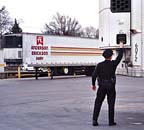

"There is no secret. We attract quality people because of our pay, benefits and reputation. Those few candidates who make it through the background investigation and employment assessment process most often turn out to be solid people. However, it is what happens during the initial training and education phase that makes or breaks an officer."
One standout example: Within the first three months of employment, all officers must complete the International Foundation for Protection Officers IFPO (Naples, Fla.) certification process as a Certified Protection Officer (CPO). "When an officer is awarded a CPO, you can literally see professional esteem bolster. It’s as if, in that moment, an internal paradigm shift occurs within that officer. Suddenly, they realize that they really have earned the right of being called a professional security officer and not a guard," he adds.

In the Lehman Security Industry Annual Report 2004, Kessler states that, although the security services market is expected to grow 6–8 percent per year in the future, this sector remains highly fragmented.
In Des Moines, Conley and his officers share a belief in themselves and their abilities.
Take security officer Phillip Ray, CPO. "After many years working in the manufacturing sector, followed by a brief retirement, I decided that I wanted to enter the security business. I didn’t want to be a security guard; I wanted to be a professional security officer." Ray uses what he gained from certification on the job all the time. "Just recently, while on patrol at my current assignment at a large metropolitan high school, I observed a vehicle that was partially blocking a busy intersection. After asking the dispatcher to contact the police, I went to the scene to offer assistance and direct traffic until the police arrived some 20 minutes later. Because of my training through the CPO certification process, I was able to direct traffic with professionalism and confidence. I know that in the future there will be new situations that I will be able to handle thanks to this knowledge base."
For Conley security officer Jessica Nothdorf, CPO, her training provided basics that come into play often. Training, she says, "covered how to properly take notes and write reports, how to properly conduct bomb searches, substance abuse issues, fire extinguisher differences and the importance of a properly and professionally dressed officer."
For William Wilson, CPO, also a Conley security officer, training, commitment and continuing education is "common sense" and "mirrored in my life’s experiences."
Senior security officer Danny Watkins, who earned both the Certified Protection Officer and Certified Security Supervisor credentials, has been energized by his and his employer’s commitment to solid, ongoing training. It’s an attitude shared by security corporal Michael Eygabroad, CPO, who sees such programs as "the key to the making of a quality security officer."

Post 9/11 needs
He adds that "Security companies, officers, the general public and above all the clients, see education as a positive and necessary step in transforming the American security industry from the observe and report mentality of the pre 9/11 world to the observe, interact and report mentality of the post 9/11 world. With the severe cut back in law enforcement funding and manpower, the security professional is the way of the future."How right he is. Dr. Robert McCrie, editor of The Security Letter, and government sources have reported the numbers of private security officers now vastly outnumber sworn law enforcement.
Conley Group officer Joshua Omvig, CPO, is an Operation Iraqi Freedom combat veteran, who says he used his training and certification knowledge base "while deployed to Iraq for a year." Another officer, Joseph Thomas, CPO, agrees. "There is no question that that it helped me with many aspects of the security field…I am now able to survey or pinpoint threats more easily." Officer Donald Cole, CPO, shared that belief. "I feel it has helped me in several situations and has also helped me to be a more confident and efficient security officer." As does officer Gabriel Swersie, CPO, who says, "I found myself recognizing fire and hazmat concerns more readily; as well, my general observation proficiency increased. I am more knowledgeable about proper procedures and I am a better report writer. When I add the sum of the parts, I am a more confident security officer and a better asset to our customers."

A New York Minute
While sharing the Des Moines firm’s commitment to professionalism, security service firms in New York City have unique challenges. One only has to look as far as FJC Security Services in Floral Park, Queens, for some reasons, according to David Link, Jr., the firm’s senior vice president.On example: Maintaining a constant low-key presence while providing 24/7 security for a large residential complex in the Bronx enabled FJC officers to observe and report key information to the local NYPD precinct. This close liaison enhanced the police’s ability to identify a drug ring and confiscate a major quantity of narcotics.
Then there was the hustler. While on patrol at JFK International Airport, an FJC security officer observed a person stealing money from an unsuspecting passenger. The officer hailed a passing Port Authority Police Department (PAPD) vehicle and reported the crime. The hustler was arrested.




